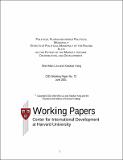| dc.contributor.author | Liu, Wai-Man | |
| dc.date.accessioned | 2019-05-01T12:12:55Z | |
| dc.date.issued | 2001-06 | |
| dc.identifier.citation | Liu, Wai-Man, and Xiaokai Yang. “Political Pluralism Versus Political Monopoly: Effects of Political Monopoly of the Ruling Elite on the Extent of the Market, Income Distribution, and Development.” CID Working Paper Series 2001.73, Harvard University, Cambridge, MA, June 2001. | en_US |
| dc.identifier.uri | http://nrs.harvard.edu/urn-3:HUL.InstRepos:39609486 | * |
| dc.description.abstract | This paper develops a general equilibrium model to simultaneously endogenize the level of division of labor, the extent of the market, the degree of inequality of income distribution, and aggregate productivity. It shows that free markets for all goods including government services generates equal income distribution, which entails great extent of the market. Hence, the equilibrium level of division of labor and aggregate productivity are high. Political monopoly by the ruling elite generates unfair relative prices of government services to other goods and inefficient inequality of income distribution, which results in a narrow market, thereby generating inefficient equilibrium level of division of labor and aggregate productivity. The degree of inefficient inequality of income distribution caused by political monopoly is positively dependent on the degree of commoners’ tolerance of unfair income distribution inequality. This degree can be reduced by free migration between countries and competition between different governments. As rivalry between sovereigns and free migration reduces such tolerance in a country with political monopoly of the elite group, the equilibrium degree of inefficient inequality of income distribution decreases. This implies attenuated rents of political monopoly. This shrink political rent will lead to free market with no political monopoly by the elite group. The story of our model is consistent with historical phenomena documented by economic historians. This model may be used as a working hypothesis for analyzing what is going on in the newly industrialized economies. | en_US |
| dc.language.iso | en_US | en_US |
| dc.publisher | Center for International Development at Harvard University | en_US |
| dc.relation.isversionof | https://www.hks.harvard.edu/centers/cid/publications | en_US |
| dash.license | LAA | |
| dc.title | Political Pluralism Versus Political Monopoly: Effects of Political Monopoly of the Ruling Elite on the Extent of the Market, Income Distribution, and Development | en_US |
| dc.type | Research Paper or Report | en_US |
| dc.description.version | Accepted Manuscript | en_US |
| dc.relation.journal | CID Working Paper Series | en_US |
| dc.date.available | 2019-05-01T12:12:55Z | |


